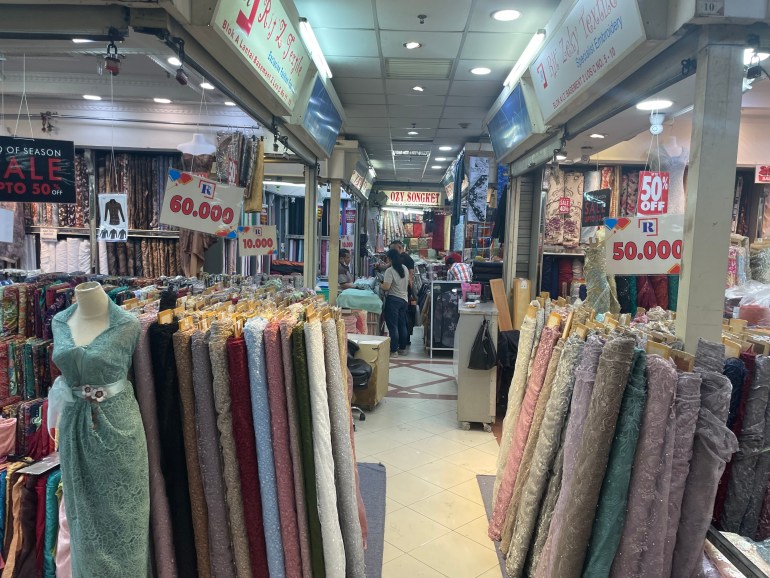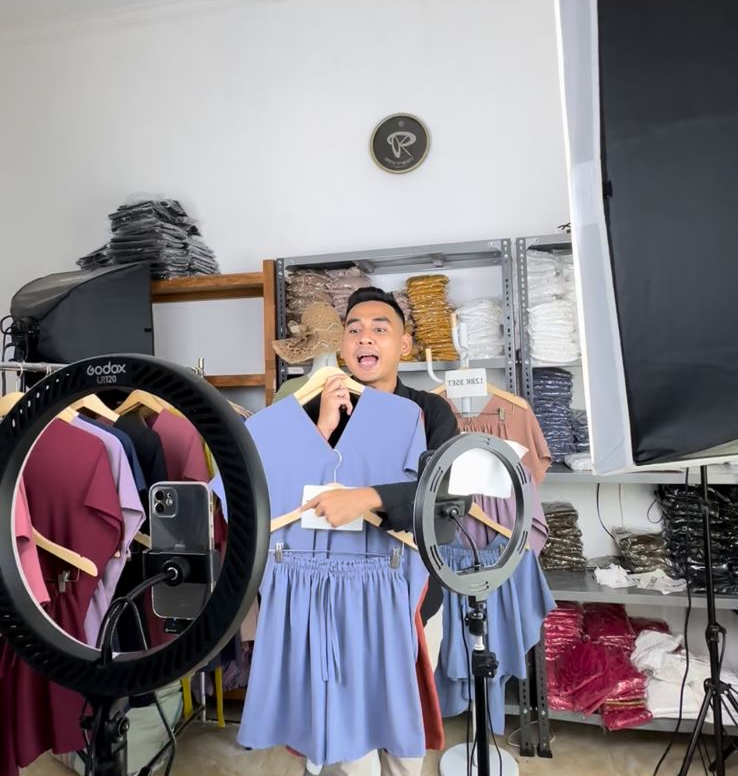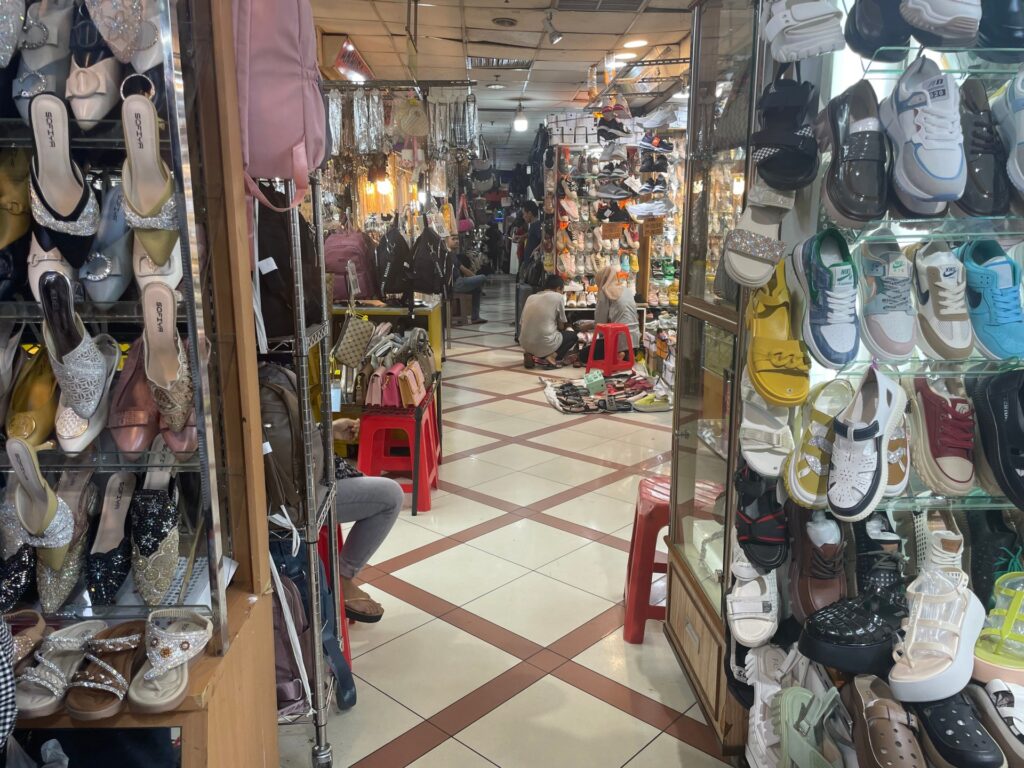Jakarta, Indonesia – Tanah Abang is Southeast Asia's largest textile and clothing market and is well-known among traders from all over Asia and into Africa. But the economy hasn't been doing so well lately, and customer traffic has been cut in half compared to before the pandemic.
The blame lies squarely with TikTok Shop, the e-commerce feature of the world's most popular video-sharing app, according to vendors at the nearly 300-year-old market in central Jakarta.
“TikTok is really bad for my business,” Hiran Nisa, whose family has been selling men's clothing in Tanah Abang for 20 years, told Al Jazeera.
“It’s different from other types of e-commerce because TikTok allows you to use videos to sell products and interact with consumers in real time.”
“It's not like in the past when this market was always crowded,” added Roni Waskeet, who has been selling shoes in Tanag Abang since 2010 and blames TikTok for the decline in business.

TikTok Shop attracted 6 million sellers in Indonesia within a year of its launch in 2021, and last year captured about 5% of Indonesia's fast-growing $52 billion e-commerce.
Before the Indonesian government banned it on October 5, the e-commerce platform had achieved its goal of increasing sales by about 350 percent this year, according to Singapore research firm Momentum Works.
Jakarta justified the ban as necessary to protect the country's 64 million micro, small and medium enterprises (MSMEs), including shops in markets such as Tanah Abang Market.
Indonesia's Trade Minister Zulkifli Hassan accused the platform of not only not complying with the law, but also of predatory pricing and facilitating the influx of cheap imports.
“Transactions on social media are not allowed. Just like television, social media is also for advertising purposes only,” Hasan told local media during a recent visit to Tanah Abang.
The ban in Indonesia is just the latest in a series of setbacks for the app, which has 125 million users, more than any other country except the United States.
The United States, United Kingdom, Canada, Australia, New Zealand, Taiwan, and several European Union countries have said that Chinese owner ByteDance uses sensitive user data, such as location information, to further its military and political ambitions. The app was banned from government devices due to concerns that it could be shared with the government. .
India outright banned TikTok in 2020 citing similar security concerns, while Pakistan and Afghanistan cited concerns about “immoral” content when banning the app.
TikTok declined the opportunity to comment on Indonesia's ban, saying only that it was complying with the law.

Some of the estimated 6 million sellers who have made a living through TikTok shops have reacted with less restraint.
Ebo Shah, founder of Bali-based women's clothing brand Biderin Official, told Al Jazeera: “I'm very sad because the government shut down the TikTok shop and the sales have almost dropped to zero.” Ta.
“Before, we used to have at least 200 sales per day. Now we use 10 or 20 [Singaporean e-commerce portal] Mr. Shop. For the time being, we will try to retain our employees. We have 10 full-time staff. However, if things continue as they are, I may have to make the difficult decision to let them go. The government should listen to us. ”
Golda Pradeksa, founder of Alya the Label, a Bali-based women's clothing retailer that sells exclusively on TikTok, said she sympathizes with traditional retailers who have lost business, but banning the platform is not the answer. he said.
“It's really disappointing because we have to redo all the content and go to Shopee,” Pradexa told Al Jazeera. ” he said.
“The retail industry is evolving every day,” she added.
“Store owners will be left behind if they don't keep up with change. But there's no reason why you can't have both an offline and an online store, because that way you can sell not just locally, but around the world. . That's exactly what I'm doing. I'm selling biderine online and my first fashion label in stores in Bali.”
Fisra Faisal Hastiadi, a former trade ministry spokesperson and independent economist who has been highly critical of the ban, said many of Tanah Abang's vendors were already mixing offline and online sales before the ban. It is said that he was letting it happen.
“It was the wrong move,” Hastiadi told Al Jazeera. “The government claims that TikTok's model (a combination of social media and e-commerce) has significantly disrupted traditional markets like Tanah Abang. But that's not entirely true.”
Hastiadi said the decline in business in markets like Tanah Abang is due to a decline in the purchasing power of low- and middle-income people since the COVID-19 pandemic, as well as an increase in wholesale buyers from Africa and other parts of Asia. He said that this was the result of a decrease in
He said the argument that cheap Chinese products would suddenly replace domestic products is disingenuous, as Chinese products have been flowing into Indonesia for more than a decade.
Regarding e-commerce, Hastiadi said platforms like Shopee and its Indonesian counterpart Tokopedia are doing more to disrupt traditional markets than TikTok.
He said TikTok Shop's rivals likely lobbied the Indonesian government to ban the platform, which has rapidly eroded market share since entering the market.
“There are theories in economics that help us understand the motivations of actors,” he said. “The trends identified in previous scenarios indicate that those who are being disturbed are trying to persuade those in power to ban or restrict the disruptors.”

In response to inquiries from Al Jazeera, Shopee and Tokopedia did not confirm or deny that they had lobbied the Indonesian government to ban TikTok shops.
When Al Jazeera visited Tanah Abang a week after the ban, vendors reported no significant improvement in foot traffic or sales.
“Things are getting a little better. But it's still not as good as before,” shoe salesman Wasquit told Al Jazeera.
“I haven't noticed any changes, but I think it's too early to tell,” added Nisa, who sells men's clothing. “But I hope things get better for us soon.”


